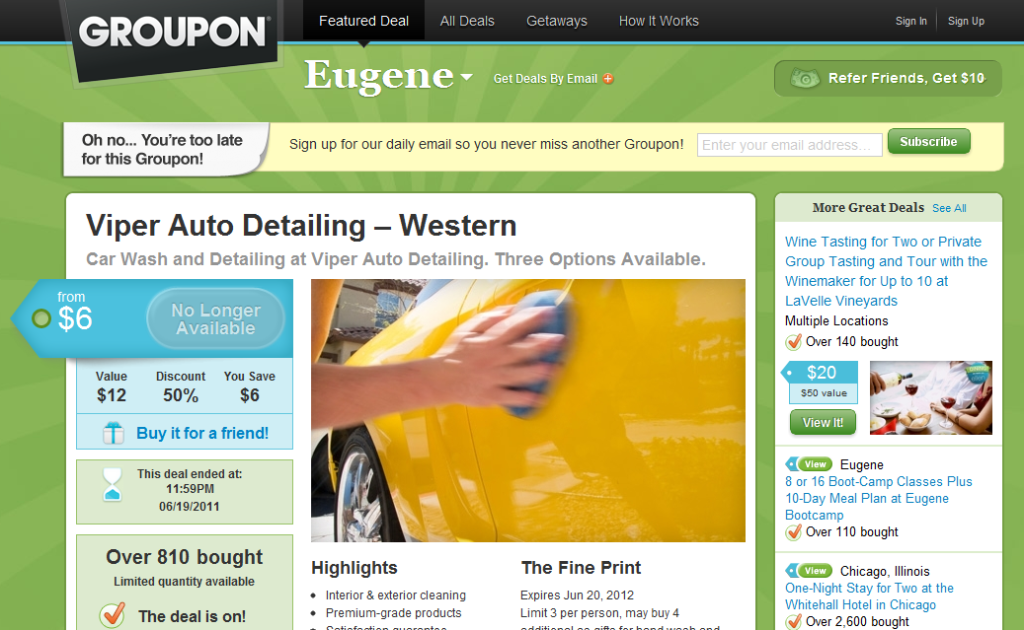 “Sorry we ripped you off. Your best bet is to go to Groupon and get your money back. We’re too chicken shit to answer the phone, so you got this message anyway. Sorry for your problems. Better luck next time.”
“Sorry we ripped you off. Your best bet is to go to Groupon and get your money back. We’re too chicken shit to answer the phone, so you got this message anyway. Sorry for your problems. Better luck next time.”
That’s the actual voicemail that greets potential customers looking to make an appointment at Viper Auto Detailing in Eugene, Ore., which ran Groupon and LivingSocial offers in June. (The audio of the message is even more galling in its flip tone. You can listen to it here.) According to statistics available on Groupon’s site, 861 Groupons for Viper Auto Detailing totaling $18,644 were sold in Eugene. The business appears to be shut down, and Groupon and LivingSocial are giving refunds to customers who purchased the offer.
This is one of dozens of stories I’ve heard of merchants closing down shortly after running a daily deal. To date, consumers have been offered Groupon credit or full refunds by Groupon when a merchant goes under or refuses to honor a Groupon. LivingSocial also gave refunds, as well as an additional $5 credit. Full refunds are great for consumers, but not for daily deals companies (or their investors).
The reasons a merchant closes down after a daily deal are varied and it can’t always be determined, even after the fact. Among the possible reasons:
- Adverse selection: Very successful businesses don’t need to run Groupons. If you have a line out the door, you don’t have to take a 75 percent hit to revenue in order to bring in new customers. If you need capital for expansion, you can go to the bank and get a loan for under 10 percent. But if your business is hurting, Groupon allows you to get cash without having to go through credit checks or other due diligence.
- Small business instability: Small businesses have a high failure rate in general. Given the long duration of many Groupons, it’s to be expected some businesses will go under during the validity period. In some states, such as California, Groupons cannot expire. This leaves Groupon with a perpetual liability.
- Fraud by merchants: Groupon typically pays out to U.S. and Canadian merchants in installments over a period of 60 days, even though Groupons are often valid for much longer. This creates an incentive for scammers to take the money and run. In some cases, the businesses close shortly after they would have received their final payment.
- A crush of traffic: Running a daily deal creates a sudden surge in demand, one some businesses aren’t capable of serving. This can lead to disgruntled customers. A recent study by researchers at Harvard and Boston University found running a Groupon can lower a business’ Yelp rating. This can cause long-term harm to a business.
Even with refund policies, a company going under can be a trying ordeal for customers, one that may make them less likely to return to the deals service. It’s unclear how many customers were affected by the sudden shuttering of Viper Auto Detailing. Viper’s Groupon ran on June 19 and Hannah B. wrote this review on Yelp August 19:
If I could rate NO STARS I would! I made an appointment. Drove clear across town. My husband drove clear across town so he could pick me up. I missed work time. THEY WERE GONE. I was told they had been missing appointments all WEEK. DON’T do it people!
Betty Barton, another Groupon customer, tried to redeem her deal by making an appointment through Viper’s Web site. She didn’t receive the promised confirmation. “I decided to go by VAD’s physical address when I was out that day and discovered they have closed up shop and vacated the premises with no forwarding address,” Barton said. “I inquired at a neighboring business and the gentleman there had no idea where VAD had moved to, or if they were still in business.”
Viper had also run a deal on LivingSocial. Barton bought that one, too. “I can imagine with the deals they were offering through Groupon, they were blindsided with more business than they could handle.” Both Groupon and LivingSocial quickly refunded Barton’s money.
Living Social’s Andrew Weinstein told me, “We are refunding all of the customers who purchased the deal and giving them $5 in additional deal bucks for any inconvenience associated with the cancellation. We proactively reach out and offer refunds in the rare cases when something like this happens.”
Groupon is also proactive about notifying consumers when a business fails or otherwise refuses to honor a Groupon. While researching this story, I received a notification that a business I purchased a Groupon for had a change in management and was no longer offering the Groupon. (My money was quickly refunded.) Although that is great news for consumers, it is a worry for investors.
 Rocky Agrawal is an analyst focused on the intersection of local, social and mobile. He is a principal analyst at reDesign mobile. Previously, he launched local and mobile products for Microsoft and AOL. He blogs at http://blog.agrawals.org and tweets at @rakeshlobster.
Rocky Agrawal is an analyst focused on the intersection of local, social and mobile. He is a principal analyst at reDesign mobile. Previously, he launched local and mobile products for Microsoft and AOL. He blogs at http://blog.agrawals.org and tweets at @rakeshlobster.
VentureBeat's mission is to be a digital town square for technical decision-makers to gain knowledge about transformative enterprise technology and transact. Learn More
